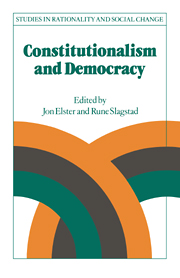Book contents
- Frontmatter
- Contents
- Notes on contributors
- Introduction
- 1 Gag rules or the politics of omission
- 3 Democracy as a contingent outcome of conflicts
- 3 Consequences of constitutional choice: reflections on Tocqueville
- 4 Liberal constitutionalism and its critics: Carl Schmitt and Max Weber
- 5 Democracy and the rule of law: some historical experiences of contradictions in the striving for good government
- 6 Neo-federalism?
- 7 Precommitment and the paradox of democracy
- 8 American constitutionalism and the paradox of private property
- 9 From liberal constitutionalism to corporate pluralism: the conflict over the enabling acts in Norway after the Second World War and the subsequent constitutional development
- 10 Arguments for constitutional choice: reflections on the transition to socialism
- 11 Constitutions and democracies: an epilogue
- Index
7 - Precommitment and the paradox of democracy
Published online by Cambridge University Press: 05 June 2012
- Frontmatter
- Contents
- Notes on contributors
- Introduction
- 1 Gag rules or the politics of omission
- 3 Democracy as a contingent outcome of conflicts
- 3 Consequences of constitutional choice: reflections on Tocqueville
- 4 Liberal constitutionalism and its critics: Carl Schmitt and Max Weber
- 5 Democracy and the rule of law: some historical experiences of contradictions in the striving for good government
- 6 Neo-federalism?
- 7 Precommitment and the paradox of democracy
- 8 American constitutionalism and the paradox of private property
- 9 From liberal constitutionalism to corporate pluralism: the conflict over the enabling acts in Norway after the Second World War and the subsequent constitutional development
- 10 Arguments for constitutional choice: reflections on the transition to socialism
- 11 Constitutions and democracies: an epilogue
- Index
Summary
Il est absurde que la volonté se donne des chaines pour l'avenir. Rousseau
Laurence Tribe opens his influential treatise on constitutional law with a concise formulation of the countermajoritarian dilemma – the discord between majoritarian politics and constitutionally anchored restraints: “In its most basic form, the question … is why a nation that rests legality on the consent of the governed would choose to constitute its political life in terms of commitments to an original agreement … deliberately structured so as to be difficult to change.” The underlying problem has been posed in a variety of ways. How can the “consent of the governed” be reconciled with the preempting of subsequent consent by a Constitutional Convention? Why should a constitutional framework, ratified two centuries ago, have such enormous power over our lives today? Why should a minority of our fellow citizens be empowered to prevent amendments to the Constitution? Is judicial review, when based on a superstitious fealty to the intent of the Framers, compatible with popular sovereignty?
The tension between constitutionalism and democracy
These questions have a long history. In the Flag Salute Case of 1943, Justice Robert Jackson issued the following classical pronouncement:
The very purpose of a Bill of Rights was to withdraw certain subjects from the vicissitudes of political controversy, to place them beyond the reach of majorities and officials and to establish them as legal principles to be applied by the courts.
- Type
- Chapter
- Information
- Constitutionalism and Democracy , pp. 195 - 240Publisher: Cambridge University PressPrint publication year: 1988
- 94
- Cited by

